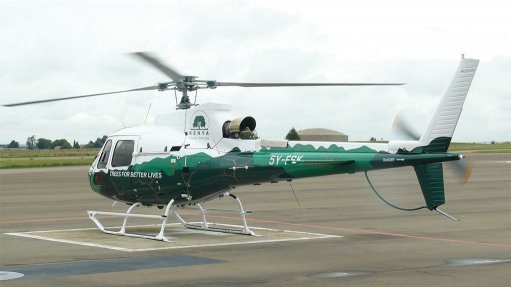
RISING MARKET An Airbus Helicopter AS350 Squirrel of the Kenya Forest Service preparing for take off
Photo by: ESAL
Over the past few years, Kenya has emerged as the biggest single market for Eurocopter Southern Africa Limited (ESAL) as the aviation sector in that country has boomed and the Nairobi government has sought to strengthen its law enforcement, security and conservation agencies. ESAL receives new helicopters from its parent company in Europe, Airbus Helicopters (previously Eurocopter), and paints them, modifies them and equips them as required by customers. It also undertakes maintenance, repair and overhaul (MRO) of Airbus Helicopter models.
“Originally, our activities were mostly . . . in South Africa,” explains new ESAL CEO Arnaud Montalvo. “In the past seven to eight years, we expanded outside South Africa, mainly for law enforcement. But, in Kenya, it is not only law enforcement – it is also other government agencies: Kenya Wildlife, Kenya Forestry, Kenya Pipeline, plus civilian operators, mostly in the utility sector.” Of the seven aircraft delivered by ESAL last year, five were to customers in Kenya. Of the seven orders that ESAL won last year, four were from Kenya.
“We are very active in Kenya,” he reports. “The Kenya Police have growing needs and have issued a tender for a twin-engined helicopter. We’re confident there will be more tenders in future. We’ll also be setting up a permanent base in Kenya, which will be part of ESAL, at Nairobi Wilson Airport. Wilson is Nairobi’s general aviation airport and police aviation base. It’s now probably the busiest airport in Africa in terms of aircraft movements.”
While the aviation sector in South Africa shrank following the Great Recession, activity in other African countries increased, especially in the law enforcement sector. “We have introduced two new platforms – the EC145, with one delivered to the Namibian Police, and the EC135, to the Lesotho Defence Force. We expect to sell more helicopters to Lesotho in the medium term. They still have ageing aircraft to replace,” he noted. “They are using an EC135 to replace an [MBB – later Eurocopter –] BO 105.”
In the civilian sector, Airbus Helicopters has enjoyed success with the offshore oil and gas sector in Angola, as well as with other civil operators in that country. ESAL is now looking at the emerging oil and gas support sector along the East Coast of Africa, stretching from Mozambique to Kenya.
“South Africa should get some of the benefits of this and it should help the local aviation sector to recover, especially the utility sector, which has been hard-hit by the crisis since 2007,” he says. “Right now, we’re still at the very beginning of these oil and gas activities, so their scale is not clear. Initial operations involve light twin-engined and medium twin-engined helicopters.”
The company is continuing to expand its support capabilities and seeking to introduce new products into its region (southern and east Africa and the Indian Ocean islands), particularly larger helicopters. Already established and operating since 2012 is the Super Puma simulator.
The Super Puma is frequently used to support the offshore oil and gas industry worldwide, but three have been lost in the North Sea over the past four years. “The latest accident is still under investigation, but the fleet has resumed operations worldwide,” points out Montalvo. “Airbus Helicopters has developed a technical solution to the problem and this is currently being implemented.”
ESAL had a turnover of about R500-million last year. The company employs 85 people, of whom 25 are engineers. It also has training facilities for mechanics, technicians and (for helicopters up to and including the EC145) pilots, plus the Super Puma simulator. It also undertakes MRO on Airbus Helicopters for customers from outside its region, such as the Middle East.
With the renaming of the parent group as Airbus Helicopter, ESAL will follow suit during the course of this year. Airbus Helicopter has some 30 entities around the world and the new name will be phased in, with the North American subsidiaries being the first of these to adopt it. ESAL will be Airbus Helicopter Southern Africa by the start of Africa Aerospace and Defence 2014, in September.